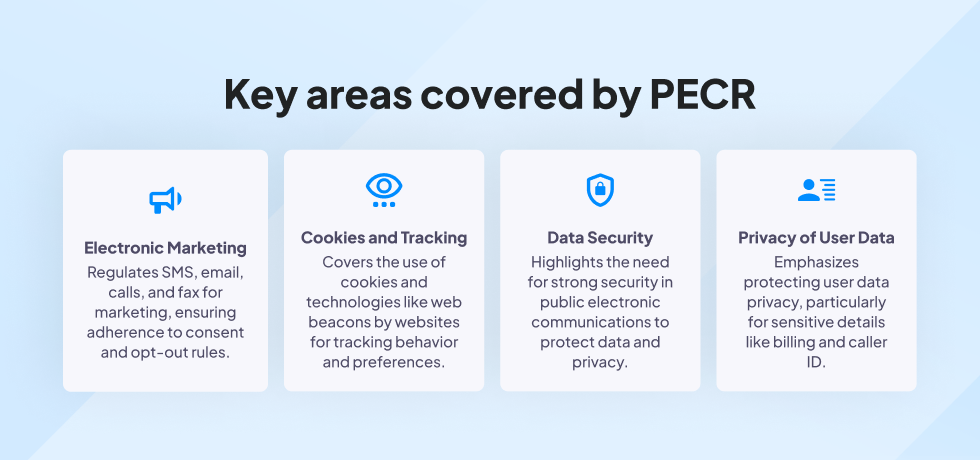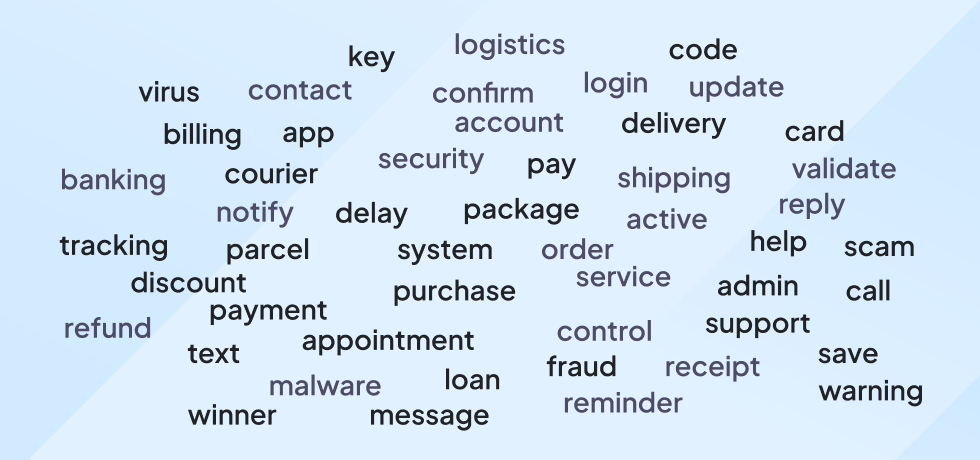
Text message marketing is completely legal in the UK. However, a few relevant local frameworks closely protect consumers’ privacy and consent rights. This article explores the legal landscape of texting in the UK post-Brexit and offers some tips on SMS strategies.
Understanding UK texting regulations
The most important laws covering how companies can contact consumers in the UK are the Privacy and Electronic Communications Regulations (PECR). While focused on more than just texting, this framework constitutes the foundation of your SMS marketing UK strategy.
What is PECR?
PECR was passed in 2003 in the UK. This framework prohibits the use of direct telephone marketing, including SMS, unless the recipient has given prior consent. The latest version of the guidelines was amended in 2019.
The legislation implemented the EU’s Privacy and Electronic Communications Directive 2002. This set requirements in the industry and provided the foundation for UK SMS regulations.
In the graphic below, we’ve outlined several key areas covered by PECR. Whether you’re a business owner, marketer, or just keen on understanding how these regulations impact digital communication, this will give you a quick yet comprehensive understanding of the scope of PECR:

Consent under PECR
As far as the marketing aspect is concerned in the UK PECR, the main focus is on user consent. A fundamental principle of this law is that sending direct marketing messages without explicit permission obtained through an opt-in is illegal.
Soft opt-in
The one exception to this standard is if there is a pre-existing relationship between the sender and recipient, also known as a soft opt-in.
Soft opt-in refers to existing customers only. The idea behind it is that someone who purchased a product from you and gave you their contact details without opting out of marketing communications is most likely happy to receive messages about similar products or offers.
However, to obtain a soft opt-in legally, you must provide the customer with the choice to opt out when you first collect their information and with every subsequent message you send.
Explicit opt-in
An explicit opt-in requires someone to perform an intentional action, such as replying with a keyword, writing out contact details, or ticking a box. It can be offered in various ways: in-store, via SMS, email, or through an online form.
Identification & data handling
Businesses must clearly identify themselves in their messages to their customers for consent to be valid. This can be easily done by mentioning your company text in the body of the SMS or signing its name at the end.
When obtaining consent, brands must also provide links to their Privacy Policy and Terms of Service in the opt-in. These documents should clearly outline which parties will have access to the data being shared.
Other UK SMS regulations
Since Brexit occurred on January 31st, 2020, the GDPR no longer affects how texting in the UK takes place. However, businesses must also respect the following guidelines in its stead:
- Data Protection Act of 2018, wherein organizations must ensure the security of personal data on behalf of their customers and obtain explicit consent for its use in text messaging, especially for marketing purposes.
- Sender ID Regulations, which were introduced in September 2023 and initially banned three specific words from being used as Sender IDs in the country: Alert, Info, and Verify. Starting with October 31st, 2023, the list was expanded to include 121 prohibited words. You can find some of them illustrated below.

Penalties for non-compliance
Non-compliance with PECR and DPA 2018 can result in significant penalties in the UK. These generally come in the form of fines issued by the Information Commissioner’s Office (ICO).
For PECR breaches, companies can face fines of up to £500,000. Under the DPA 2018, the penalties can be even more severe. Fines might amount to £17.5 million or 4% of the company’s total annual worldwide turnover, depending on which is higher.
How to choose a UK texting service
Compliance with local text messaging laws is the most important aspect when choosing your UK texting service. In addition to this, you should also look at the following:
- User-friendly interface
- Simple virtual number or sender ID activation
- Automation and integration capabilities
- Analytics and reporting
- Scalable and reliable platform
- Contact list segmentation
- Free trials or product demos
- Favorable customer testimonials and reviews
Enhance your UK business communication with Textmagic!
SMS costs in the UK
The cost of texting in the UK varies depending on your chosen UK texting service. Prices per SMS usually range from £0.02 to £0.05 per message.
The cost of sending SMS in the UK with Textmagic is £0.04 per message.
Reserving a virtual number or a sender ID will cost you around £10 per month. This price may vary depending on your chosen service provider.
If you exceed the SMS limit in your plan, you will also have to pay overage fees that typically range from £0.01 to £0.04 per message.
On top of these costs, you should also consider that additional fees might occur. For instance, some providers charge setup fees for initiating the service for you.
How to launch your SMS marketing UK campaign with Textmagic
Choosing a text messaging platform that prioritizes security and compliance helps mitigate legal risks, allowing you to uphold your reputation as a business. Textmagic adheres to all UK data privacy and compliance standards while being GDPR and SOC 2 compliant.
There are many ways in which UK businesses can use the Textmagic platform for SMS marketing and other important communications. This guide will walk you through how to launch your SMS campaign with Textmagic in a few easy steps.
- Create a Textmagic account
Start by signing up and verifying your Textmagic account via the code received in your email. This will grant you access to a free virtual number for one month and a broad range of SMS tools.
- Choose a phone number
Virtual SMS numbers are used for two-way conversations. You will immediately receive one upon creating a Textmagic account, and you can start texting immediately. You can use this initial number free of charge for one month.
You can also apply for an alphanumeric sender ID for your business. This has to be specific to your business and not a general word like SMS, Info, or Alert. However, sender IDs don’t allow replies, so you can only use them for one-way communication.
- Import and segment your contacts
Import your contacts to Textmagic and segment them into lists to maximize engagement. This is useful for SMS campaigns and internal communications alike.
For example, you can create multiple lists for your customers depending on their status or messages they’re interested in receiving.

Similarly, for internal messages, you can create an ‘Employees’ mailing list under the Lists tab in Contacts to easily disseminate notes and updates to staff.
You can also leverage Textmagic’s opt-in and opt-out management features to maintain accurate contact lists. Expand your audience with online forms or create automation rules for granting and revoking consent easily through SMS keywords.
- Launch your campaign
You can now start sending messages to your audience while fully complying with UK data privacy laws.
- Collect customer feedback
Use the SMS Surveys feature in the Services tab to create and send surveys, gathering valuable customer insights that will help you better tailor future campaigns.

The Textmagic business text messaging service can also help with:
- No-code integrations with your business apps
- Personalized messages and campaigns
- Customer support updates
- Delivery and order information
- Emergency alerts
Best practices for texting in the UK
Fostering a good relationship with your UK audience is simple if you remember a few key factors. In addition to collecting lawful consent, PECR stipulates that messages sent to consumers mustn’t cause nuisance or harm.
This covers timing campaigns during quiet hours, avoiding spamming customers with SMS, and other areas. Here are some best practices to consider for your SMS campaign.
- Keep updated contact lists. The most effective way to do this is by asking subscribers to re-confirm their consent periodically. In this way, you can ensure continued compliance.
- Don’t send messages too often. An average of one message per week is generally enough to keep your mailing list nurtured while not being annoying.
- Time your campaigns. Avoid early mornings before 9 a.m. and late nights after 8 p.m., as they are quiet hours during which you can’t message users. Going for typical lunch break intervals is recommended. Getting this right is especially simple in the United Kingdom, which only has one standard time zone: Greenwich Mean Time (GMT).

Conclusion
Achieving full regulatory compliance with the UK’s regulatory frameworks is the first and most important aspect to consider for the success of your SMS marketing efforts. By considering customer consent and information accuracy, you can ensure your audience will be engaged and satisfied at every step.












![Mangools Coupon Feb 2024 [55% Off, $684 Savings🔓]](https://marketingmagnetinsider.com/wp-content/uploads/2024/02/mangools-coupon-75x75.png)








